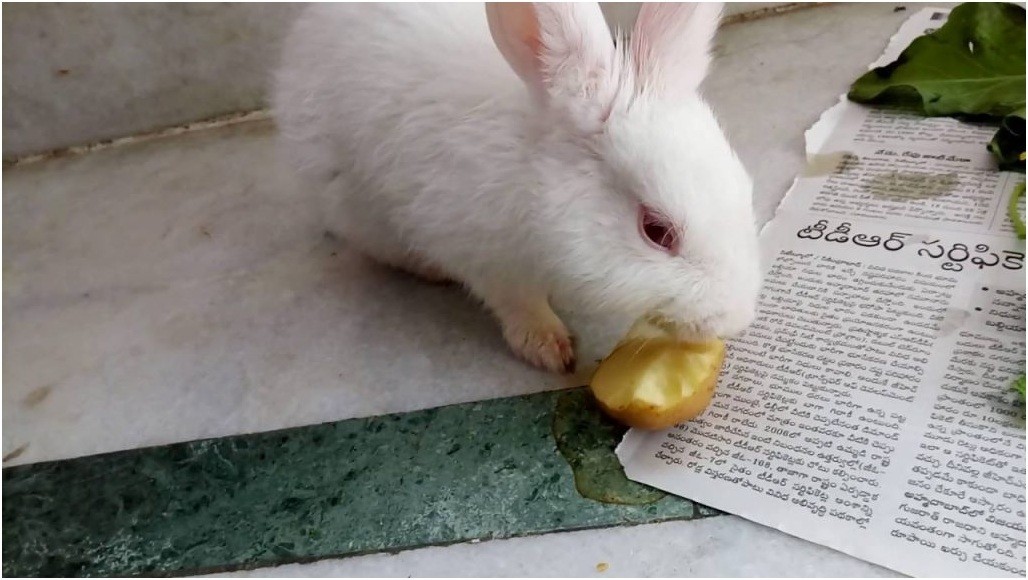Can rabbits eat vegetables?
There are numerous vegetables that can be fed to rabbits. The most nutritious type is fresh leafy green vegetables, such as romaine lettuce and parsley. Some types of starch vegetables are also suitable. However, they should be fed in moderation. You can also mix vegetables with water to give your rabbit a drink. This should fall into good rabbit food, anytime, any day.
Some of these vegetables can be dangerous to rabbits, so give them only a few small portions at a time. However, you should avoid giving them complex carbohydrates and sweets, because this can lead to obesity. Fresh vegetables, such as carrots, are okay for your rabbit to eat. But, if you’re giving them a large portion, it’s a good idea to cut them into pieces about one inch long.
Another vegetable that rabbits can eat is celery. It contains vitamins and minerals and is a great source of fiber. Avoid giving your rabbit potatoes or mashed sweet potatoes, as these are difficult to digest. However, you can give your rabbit collard greens, which provide them with essential minerals and dietary fiber. Also, don’t give your rabbit corn on the cob. It can cause stomach pain and gas. You can also feed your rabbit watermelon, which is excellent for hydration during the summer months.
Although rabbits can eat vegetables and fruits, it’s best to introduce vegetables and fruit gradually. Changing your rabbit’s diet suddenly could upset his digestive system and lead to diarrhea and sickness.
Can Rabbits Eat Celery Leaves?
Can Rabbits Eat Celery Leaves? Also, the question about Can rabbits eat bok choy arises from another one as can rabbits eat celery leaves? Yes, but it should be cut into small pieces or shaved off completely. It contains fiber strings and can be a choking hazard. For best results, give your rabbit only celery leaves. If you can’t find the leaves in your grocery store, try looking for them at farmer’s markets. Even if you can’t find them, you can always grow them yourself, but if you want to be sure, don’t give them the whole plant!
If you do give your rabbit celery, cut it into half-inch pieces. It’s important to cut it into tiny pieces and introduce it slowly, keeping an eye on your rabbit’s reaction to it. If you notice an abnormal reaction from your rabbit, stop giving them celery until the symptoms clear up. This will ensure that your rabbit is not suffering from a serious condition.
As long as you don’t feed your bunny too much, celery is safe for your rabbit. Be sure to cut the celery stems off. This will prevent them from choking and also prevent them from going moldy. If you can’t find celery that doesn’t have any chemicals on it, don’t give it to your rabbit. It’s not harmful to your rabbit but it’s best to avoid it unless you are absolutely sure it’s completely safe for your bunny to eat.
Can Rabbits Eat Bananas?
Bananas are delicious treats for rabbits, and they’re safe to give them in moderation. Their sweet tooth makes them naturally attracted to sweet fruits and vegetables. In order to minimize the risk, make sure your pet is getting enough of the good stuff.
Bananas are high in sugar, and they’re difficult for rabbits to digest. The starch content in bananas can also create physical energy problems. A better option is to feed your rabbit banana peels. It’s best to buy organic bananas for your pet actually rabbits are a Best Pets for Apartments. In addition, banana peels contain lower amounts of the sugar and starch that can harm rabbits.
Bananas Sugar Contain
Can Rabbits Eat Bananas?
The peels of bananas contain less sugar than the flesh of the fruit. But unripe bananas may contain more starch and may cause digestive issues for rabbits. Just make sure they’re pesticide and toxin-free. As Rabbits are Best Small Pets for Depression so be care about your pet. And don’t forget to consult with a veterinarian first. And remember, a few bananas a week will do your rabbit no harm.
Can Rabbits Eat Apples?
While a small number of apples can be nutritious for your pet rabbit, the seeds and cores can cause serious stomach upset and even illness. Although fresh apples are widely available in grocery stores, it is important to keep the amount of fruit you give your pet small. In addition to avoiding toxicity, apples should be given in moderation to avoid compromising their health. Rabbits are Low Maintenance Pets for Apartments so their health and nutrition are important for all member of apartments.
Apples contain mostly water-soluble fiber, making them ideal for rabbits. However, the seeds and stems are toxic to them. Before introducing fruit to your rabbit, you should ensure it has been thoroughly washed. Additionally, many apples are heavily sprayed with pesticides that can be harmful to your pet. Therefore, you should make sure that you only provide your pet with organic apples. This way, they’ll consume fewer chemicals.
If you’re planning to give your rabbit an apple, it’s important to keep in mind the amount of sugar and the amount of fiber. Furthermore, you should be aware of the acidity level of other fruits you give your rabbit. Everyone needs an Easy to Take Care of Pets with Small Low Maintenance. Ultimately, you’ll be able to determine which fruit is best for your rabbit.

Can Rabbits Eat Broccoli?
However, you should avoid giving them any other ingredients from your kitchen because they are not safe for them. Especially aware about kids as the rabbits are best Pets for Kids and These Are the Good Pets. This is especially important for baby rabbits as their dietary requirements are much different from their parents. If you are worried that your pet will get sick from eating broccoli, make sure you give it a treat first.
Broccoli is a rich source of vitamin K for rabbits, and it has a variety of other health benefits. Although the concentration of vitamin K in broccoli is lower than the vitamin C and B in other vegetables, it contains more vitamin B than either of those two. Both vitamins contribute to the proper functioning of your rabbit’s digestive system, nerves, and immune system. It is also good for your rabbit’s skin, fur, and nails. Be ready your pet as Cuddly Exotic Pets.
Despite its health benefits, broccoli can cause gas in a rabbit’s stomach. As a result, it is best to start with a small portion of the vegetable and monitor the reaction carefully. In general, the vegetable is good for bunnies, but it is best to avoid too much. If your rabbit begins to have diarrhea, stop the experiment immediately and consult a vet to be sure. The right amount of broccoli can be extremely beneficial for your bunny.
Can Rabbits Eat Cucumbers?
Cucumbers can be a delicious and nutritious treat for your pet rabbit. If you are not sure whether they will like it or not, you can slice the cucumber and give it to your pet. It is best small pets for cuddling. You can also give cucumber flowers to your rabbit, but make sure they don’t have any hairs. If your rabbit adores the taste of cucumbers, you can give it to your pet.
It contains a good amount of beta-carotene, which helps your rabbit’s immunity, eye and skin, and prevents cancer. It is important to remember that even seeds can be poisonous to rabbits, but you should still feed your pet with cucumbers. If you choose to give your rabbit cucumbers, make sure to wash them thoroughly before giving them to your bunny.
While cucumbers can be a healthy snack for your rabbit, they may not be the best food choice for your pet. If you feed your rabbit too much of them, they will have digestive issues, runny stools, and poor appetite. Hence, it is important to check the label carefully before giving your rabbit any type of food.

Can Rabbits Eat Blueberries?
When you are considering introducing a new fruit to your pet rabbit, you might be wondering, can bunnies eat blueberries? Fortunately, this is an easy and delicious treat that most will happily eat.
Unlike other fruits, blueberries are low in fiber and are safe for rabbits to eat occasionally. If you give your rabbit too many blueberries, it could lead to dental problems, weight gain, or a smelly enclosure. To prevent these problems, you should wash blueberries thoroughly and introduce them to them gradually. You should also mix the berry with vegetables to discourage your rabbit from picking through the food.
The first time you give your rabbit blueberries, it is important to watch your animal closely. The first few days of feeding your rabbit blueberries are critical, so be sure to follow their progress with monitoring. Your rabbit should be pooping regularly, which means they’re digesting the berry.
Can Rabbits Eat Spinach?
Rabbits are omnivores and can eat spinach leaves and stems as a source of nutrition. The plant contains calcium, oxalate and magnesium. The nutrients found in these foods are beneficial for humans. However, it is not recommended for everyday consumption by rabbits. They can only ingest raw spinach leaves and stems, and may not be able to digest cooked spinach. The cooked spinach will block their digestive tracts and may even cause death.
While spinach is generally safe to feed to your rabbit, make sure you don’t give it a daily serving. The oxalic acid found in this vegetable can bind with other minerals in their body and cause problems for your pet. These include itchy skin, bladder stones and kidney issues. The pesticides in conventional spinach can harm your animal’s digestive tract, so it’s best to avoid giving your rabbit this plant.
Spinach is low in oxalate, but it contains sufficient levels of fiber to support your rabbit’s digestive tract. When fed in large amounts, it can cause GI stasis, which can result in blockage and even death. The roots of spinach have higher levels of sugar than the stems. As a result, you should cut the roots before feeding spinach to your rabbit. If the stools are normal, you can feed it the full amount.
Can Rabbits Eat Sweet Potatoes?
If you’ve ever wondered whether or not you can feed your rabbit sweet potatoes, the answer is a resounding yes! This starchy, sugary vegetable is high in micronutrients and is an excellent source of beta-carotene, which is converted by the body into Vitamin A. Unlike other foods, sweet potatoes do not cause a negative reaction in your rabbit’s digestive system. In fact, they may actually be a good choice for a diet that’s lacking in other nutrients. However, there are several issues with feeding sweet potatoes to your rabbit.
While sweet potatoes are not harmful to rabbits, they’re not a healthy addition to a rabbit’s diet. Their starch and sugar content makes them a poor choice for small pets.
While sweet potatoes are not a bad idea for rabbits, you should keep their diet free of them if possible. They need plenty of fiber in their diet, and sweet potatoes don’t provide them with enough. It’s best to limit their intake to small amounts and use them sparingly. They’ll have a much higher intake of fiber when you’re feeding them sweet potatoes, so it’s best to feed them in moderation and not everyday.
Can Rabbits Eat Cabbage?
Fortunately, the answer is yes. Although this vegetable is not poisonous, it should be introduced slowly. It is not recommended to feed your rabbit more than one or two leaves per week, as this vegetable rots quickly. Your rabbit will become uncomfortable and will not eat or drink for several hours after ingesting it.
The first time you feed your rabbit cabbage, be sure to use a small leaf. The small size will prevent your rabbit from passing gas, and it will be easy to ensure your pet doesn’t get bloated or diarrhea. Adding more cabbage to your rabbit’s diet gradually should alleviate any gastrointestinal problems, but you should consult your veterinarian if you notice any unusual symptoms. After several days, your rabbit should be eating fresh cabbage without any negative effects.
When you first start introducing cabbage to your rabbit, you must keep in mind that different animals may react to it differently. If your rabbit has never eaten cabbage before, it may experience indigestion almost immediately. If your rabbit seems sluggish and has runny poop, it’s time to start reducing the amount of cabbage your bunny eats. As the food is high in sugar and fiber, you should avoid introducing it to your rabbit at an early age.
Can Rabbits Eat Asparagus?
Asparagus is mostly composed of protein, but it also contains a small amount of fat. It contains 3.9 grams of carbohydrates, 1.9 grams of which are sugar, and 2.1 grams of fiber. It is also low in sodium.
When feeding asparagus to rabbits, you must make sure to keep a close eye on their digestion. Unlike humans, rabbits may not be able to digest it well, and so they should be introduced to it slowly. If your pet’s stomach is upset after the first few feedings, you should stop giving it to it until it recovers.
Asparagus is a member of the onion family, so it should be safe for your pet to eat. Asparagus has high water content and is therefore considered a laxative and diuretic.
Can Rabbits Eat Carrots?
Can rabbits eat carrots? The answer is no. In a recent study, the RSPCA found that 11% of all dogs and cats suffered from tooth decay. Although a rabbit might not show signs of pain, it will still cause immense pain and may even lead to their death. Hence, you must never feed your pet a carrot on a regular basis.
Carrots are rich in several nutrients and can be fed to your rabbit without any problem. However, you need to monitor your rabbit’s intake closely to avoid over-feeding.. They are especially high in vitamin A, B6, C and E. They are also high in dietary fiber and sugar.
When feeding carrots to your rabbit, make sure you don’t overfeed them. You’ll want your rabbit to be satisfied with a small amount every couple of days, and you don’t want to feed them too much on a day when you’re giving them other treats. While carrots are high in fibre and Vitamin A, too much sugar or starch can upset the digestive system of a rabbit. You should try to vary the amounts that you give them.
Can Rabbits Eat Bok Choy?
How Long Do Gerbils Live?
Snapping Turtle Food.
White Maltese Dog.
Can French Bulldogs Swim?
Chinchillas as Pet
Can Guinea Pigs Eat Strawberries?
White German Shepherd Dog.
Are Hedgehogs Good Pets for Kids?
Blue Heeler German Shepherd.
Orange and White Cat Breed.
The Smallest Cat in The World.
When do Hamsters Hibernate?
Can Bearded Dragons Eat Bananas?
Best Pets for Apartments Living.


Trackbacks/Pingbacks